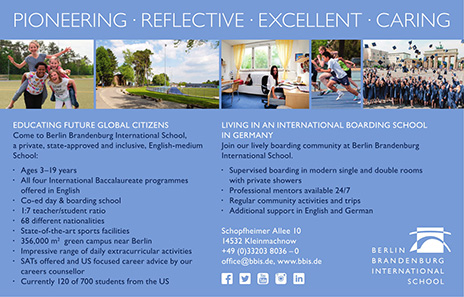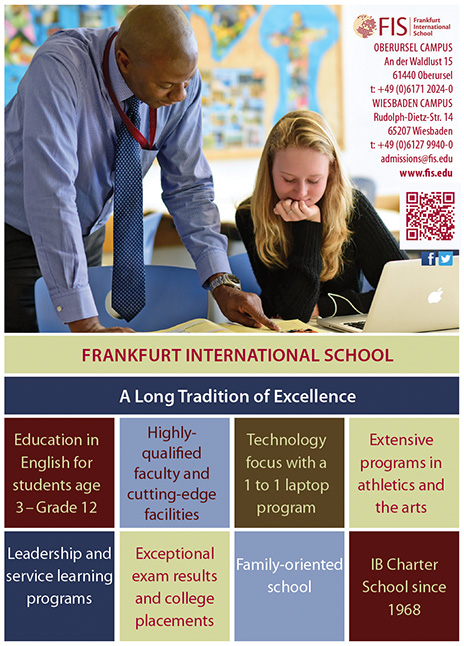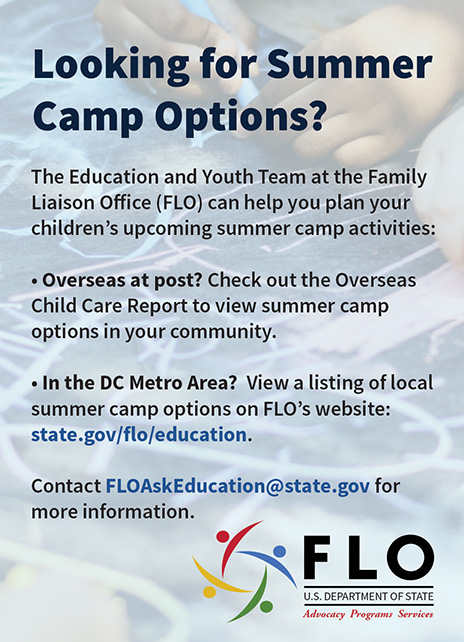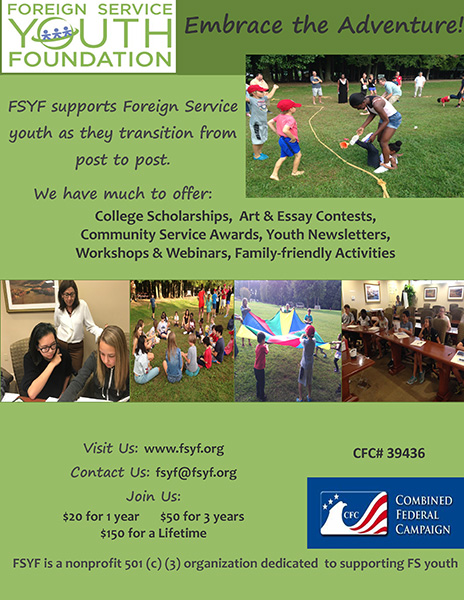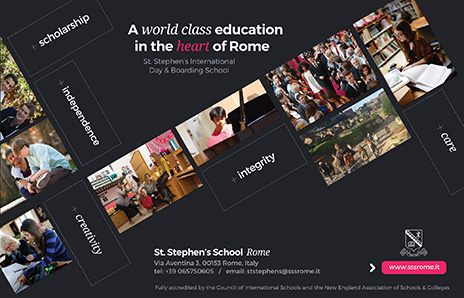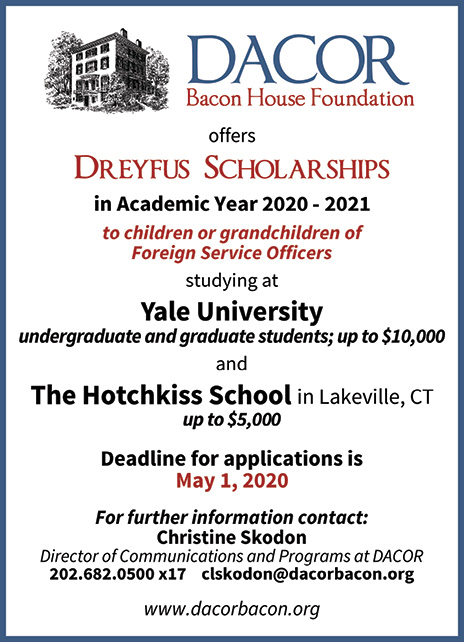All About Internships
Pointers on how to get an internship and make it an effective career-builder.
BY JACOB BORST
Landing an Internship
My internship journey began when I was a college sophomore. My goal was simple: get a summer internship so that I could get out of my parents’ house, explore what it means to be me and figure out what I wanted to do with my life—no big deal.
The Search for Internships
Word to the Wise: State Department Internships
If you land a coveted State Department internship, chances are good you’ll get a lot out of it. You’ll be on the front lines, helping promote U.S. foreign policy from its beginning to execution, overseas and at home. It isn’t all positive, however—there are some important factors to consider when deciding whether to accept such an internship.
Slow security clearance process. Don’t expect to have several months to plan your trip to Washington, D.C., or an overseas post. Last-minute clearances are common. If you don’t receive your security clearance in time, I learned, your overseas internship will be canceled, through no fault of your own.
Many points of contact. When applying to work at an overseas post, expect multiple people to handle your processing—and be aware they don’t always talk to one another. I recommend keeping all parties updated on everyone else’s actions, especially concerning the security clearance process.
You won’t get rich. The costs associated with getting to and living in D.C. or overseas may pose too great a financial burden for students. Currently, the Pathways Program is the only paid internship program that State offers.
“So … what will you do with a B.A. in international affairs and French?” I was often asked.
My automatic response was “government work,” because that was all I knew. When first looking for internships, I was stumbling around in the dark. Where did I want to intern? How would I find places to apply? How many should be on my list?
Here’s what I figured out.
Talk to professors you trust. Since I had a general idea of what I wanted—something including both my majors—I went to my French professor. Once I explained my interests, she offered a suggestion: an internship with a foreign embassy. I did a simple Google search—et voilà! The French embassy in D.C. offered internships for American college students. Talking to your professors can be a valuable first step as you begin your research. I was on my way.
Know your strengths and weaknesses. When considering where to apply, also think about your preferences. For instance, if you’re a strong writer, your best bet might be an editorial internship. Or if, say, math isn’t a strong suit, an internship involving statistical analysis probably isn’t the route for you. Don’t be put off by challenging tasks, though, and don’t limit yourself by sticking only with what you know. Apply to internships that will expand your professional repertoire.
Research the organization. As tempting as it can be, don’t just click on the organization’s intern page and start applying. Take a look at the website. Read the mission statement. Understand the intern’s responsibilities. Although specifics aren’t always listed, ideally you should know general expectations before you apply.
Check out USAJobs.gov (the federal government’s job website) to get a feel for the jobs out there. There’s a place in the federal government for nearly every college degree, not just for political science and economics. You’ll see postings ranging from Army cook to chief policy analyst. Narrow your search by selecting the “students and recent graduates” option. Open an account, and you can save any jobs you find promising.
I applied to my Virtual Student Federal Service internship through USAJobs.gov, and only a statement of interest, résumé and references were required. Since my application was a general one, addressed to all State VSFS programs, the acceptance email from the VSFS team included my placement at the U.S. embassy in Ottawa. I then received an email with project details from the embassy’s VSFS coordinator. There was no interview for VSFS—bonus!
Utilize AFSA. AFSA’s website is a great resource for internship seekers. Check out the student resources webpage (afsa.org/students)—that’s how I landed my first internship at the Association for Diplomatic Studies and Training.
The Nuts and Bolts of Applying
I knew that applying to any internship would require at least a résumé and cover letter, but I had no idea where or how to begin. And since first impressions are literally everything, I wanted these documents done right—but how?
Visit your school’s career services center. Ask the adviser for templates and examples; mine created an individualized format, and now I just follow the pattern. Throughout undergrad, I sent application materials to my adviser to check for wordiness, formatting and so on. Brevity is key.
What if you don’t have “relevant” experience? If you don’t have previous internships to mention, high school and early college jobs can showcase professional characteristics, such as punctuality, teamwork and leadership. Be specific: “While teaching swim lessons and lifeguarding, I demonstrated leadership, communication, trust and oversight by creating a safe environment.”
There’s a place in the federal government for nearly every college degree, not just for political science and economics.
Avoid generalizations—“My time as a lifeguard gave me work experience” is not going to cut it. Use what you have: campus organization participation, research projects, part-time jobs and so on. Seemingly unrelated jobs can be relevant if you can draw a connection between them and the internship.
Get references. For my first internship applications, I listed my bosses from high school and college jobs and one of my international affairs professors—after having obtained their consent. I still use their names as references, with permission.
Get help editing your application documents from a professor, career adviser or writing center staff member. If you are writing in a foreign language (such as for a cover letter to an embassy), make sure to have a native speaker edit it.
Write a cover letter that shows you have taken the time to research the organization and its mission. Use it to highlight, in complete sentences, any prior experience. If asked for writing samples, choose sections from your best research papers (the ones that received top grades), double-check the grammar and attach the file as a PDF. All attachments must be PDFs unless otherwise requested.
Follow all delivery directions. Some places have explicit expectations regarding the email subject line, the file names and order for attached documents, for example. Any deviation may land your unread email directly in the trash bin.
Make sure your message is addressed to the proper person, using that person’s full title. It should explain who you are (school and major), state your intention (“I would like to express interest in X internship program with X organization for X semester”), and ask for a response (“I look forward to hearing from you soon”).
Edit your email message, and have someone else do this, too. Avoid exclamation points. Don’t lose your shot at an internship because of hasty writing.
Prepare to wait. The immediate, short-term goal of applying is to get an interview, not to get hired. In my experience, it is normal not to get a response to an internship application; an automated response confirming receipt isn’t unusual, and a speedy, non-automated response within a week or so is positively cause for celebration.
Seemingly unrelated jobs can be relevant if you can draw a connection between them and the internship.
When I emailed my statement of interest and the required documents (cover letter, résumé and a writing sample) to ADST, the executive director returned my email the next day and assured me that I would hear something in the next few weeks. Five days later I had the internship. I never did get that French embassy internship, but I applied multiple times anyway. I applied for AFSA internships several times before I finally got one; sometimes it takes a few tries to get the desired result. Be stubborn, and don’t lose hope. Internships are competitive, and some of it is sheer luck.
Interview Preparation
These days, interviews can be conducted in person or by phone or video call. My internship interviews have all been by phone.
Research the organization (e.g., its mission statement, leadership, hierarchy, projects); have this information with you at the time of the interview. Familiarize yourself with the organization’s website; have it open during the interview. Know your interviewer’s title, name and position.
You did the initial research when making your list of possible internships; now it’s time to delve deeper into the organization. Maybe a notable project is going on, and you’d like to get in on it. Be sure to mention your eagerness “to contribute to X project so that X result can be achieved.” Finding a balance between complimenting the organization and highlighting your achievements and qualifications is tricky—it takes practice.
Know why you want that particular internship. What do you want out of it? What skills would you like to develop? Have a ready-made statement like what is in your cover letter. Here’s an example: “I’d like to gain a better understanding of how the Foreign Service works, and interning with X organization/ office/etc. would help me do this.” Talk about yourself, but also talk about the organization and what you can do for it.
Compile a list of possible questions, as well as a list of what you’d like to ask the interviewers. For each question, have a succinct answer with proof. For example, if you think they’ll ask what specific experience you have that would contribute to a certain project, be ready to describe a project, paper, event or challenge that showcases a skill or quality connected to the internship. Think about teamwork, independent work, timeliness, writing and research abilities, communication, and so on. The classic “two strengths and a weakness” question is sure to show up—prepare an answer. Keep all prepared questions and answers in a Word document so that you can find them during the phone interview.
Preparing for an interview is time consuming. Accept this challenge, and look at the interview as an opportunity to practice your interview skills. Even if you don’t get this internship, it’ll help you prepare for the next application.
You Got the Internship: Now What?
Congratulations! Your hard work has paid off, and you’ve landed the perfect internship. Now it’s time to think about money, housing and all the other things you need to think about to make sure this internship is a success.
Funding
Starting Your Housing Search
The following sites can be useful as you start your housing search for a D.C. internship.
University Summer Housing
- George Washington: https://summerhousing.gwu.edu/individuals-options
- American: https://www.american.edu/ocl/conferences/Intern-Housing.cfm
- George Mason: https://housing.gmu.edu/summer-mason/intern-housing
- University of the District of Columbia: http://docs.udc.edu/housing/Housing_Application_Summer_2018.pdf
- Howard: https://howardsummerconferences.com/summer-rates-payment/
- Catholic: http://conferences.cua.edu/summer/rates.cfm
- Georgetown: https://residentialliving.georgetown.edu/summer/individual#
Note that university housing in D.C. is subject to the 14.8 percent D.C. housing accommodations tax.
Subletting Sites
- Craigslist: https://washingtondc.craigslist.org/d/sublets-temporary/search/sub
- Facebook groups: bit.ly/fb-subletting and bit.ly/fb-subletting2
Corporate Sites
- WISH: https://internsdc.com/rates/
- Capstay: https://www.capstay.com/prices/
- Attache Corporate Housing: https://stayattache.com/search/results
Transportation, housing and daily living costs are high in D.C., so carefully consider your financial situation.
Universities often have money set aside to help defray the costs of internships for their students. When I was offered my second D.C. internship, I applied for two scholarships to fund my senior honors project at my university. While the school did not technically pay for the internship, it did help offset the expenses associated with interning in D.C., which was a part of this project. Early on I cultivated a relationship with my project adviser, who helped me win the scholarships that enabled me to intern. Good professors want their students to succeed, academically and professionally. Argue the case of internships being connected to academics—your favorite professor may just lend a helping hand.
Local organizations such as your K-12 PTOs, Greek life and Rotary Clubs may also be willing to help. Make a call, send an email, reach out to friends and neighbors. Join Facebook groups, create a GoFundMe, get a part-time job. Anything is possible.
Housing
When it comes to housing, most interns are left to fend for themselves. Do not finalize housing until you’ve received a definitive acceptance. Once you’ve cleared that hurdle, it’s time to consider your housing requirements. Some factors to consider: furnished or unfurnished? Short-term? Your own bath? Location versus commute?
There are three major housing types for interns—university, subletting and corporate—and each has pros and cons.
University housing dates are set well in advance, buildings are safe and there are both private- and shared-room options; some universities may offer this program only in the summer, however.
Subletting is a mixed bag: dates and cost are flexible and extremely variable, allowing the intern to work out the best and cheapest option. Finding a place to sublet, however, is complex. It’s time consuming, decisions are often made at the last minute, and roommates can be unpredictable. Never pay anything until you’re standing in the apartment and can verify that your roommate/landlord isn’t a scammer.
Don’t try to pull it all together just weeks before you need to be there. You may be left in the lurch because if the roommate/landlord backs out or your search bears no fruit, it will be too late to find university or corporate housing.
Subletting can be the cheapest housing option. If you have specific needs though—your own bedroom and bathroom, a short commute, easy access to a gym—then the cost of subletting can be high. Living outside the city can reduce the cost of living, but for both of my D.C. internships, I stayed in the city: there’s so much to enjoy, and I have no regrets about paying a higher rent than interns who commuted from the surrounding areas.
Corporate housing may be the solution if you don’t want the hassle of hauling furniture, bedding and kitchen supplies. But it can be costly. Read the contract carefully: dates are set in advance, so if you only need two months out of a four-month minimum stay, you’re still paying the full amount.
On the Job
Add to your skill set. You’re interning to learn new skills and make yourself more marketable. Compile a list of accomplishments during your tenure, including events you attended and projects you completed. Add these to your résumé or LinkedIn account. When you need a letter of reference, send your list to your internship supervisor who can easily write you a letter.
Do the work. Work ethic determines reputation, so fulfill your duties scrupulously. Every action has the potential to shape letters of recommendation and the possibility of future references. Be proactive and show initiative.
Build relationships. Check in with your boss and colleagues during the week. Consider emailing a daily list of what you’re working on: this shows initiative. When you form relationships, it’s much easier to ask for favors, such as requesting to work on a special project or an afternoon off to network.
Network. Make connections with people in your line of work and in related fields. When job hunting after graduation, you will have somebody to call and ask for help. Start with LinkedIn. Using the website’s filters, you can find your university’s alumni in your field and in the D.C. area. Contact them, pointing out the alma mater connection. (You can also reach out to them when looking for an internship.)
VSFS: The Federal Government’s E-Internship Program and Opportunity Equalizer
Internships are great for professional experience: they build the student’s résumé, and they guide the student in determining a job path and/or graduate degree program. But for students interested in working in foreign affairs, there’s one big problem: most available internships are in the Washington, D.C., area. And for many geographically challenged students, it simply isn’t possible to move here for an unpaid temp job.
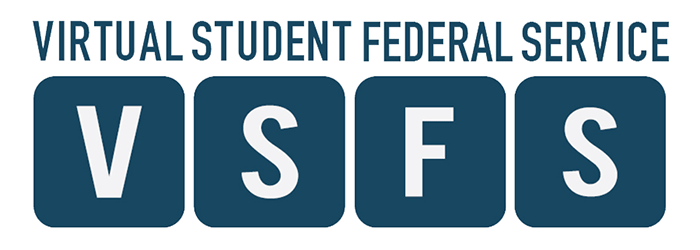
That’s where VSFS comes in. Launched in 2009 in the Department of State as the Virtual Student Foreign Service program, it allows students to work remotely for a federal agency. In 2017 VSFS changed its name to “Virtual Student Federal Service,” to reflect the fact that there are now more than 70 participating organizations, more than 40 of which are federal agencies, including USDA, VA, DHS, DOS, OPM and HHS.
The State Department has led the effort to get American college students from around the world involved in our foreign policy process through this e-internship program. While VSFS interns are unpaid, students benefit by gaining professional experience and marketable skills, increased knowledge about a particular agency, networking contacts and a line item on their résumé showing they have interned for a federal agency or internationally recognized organization.
Entrepreneur Ahva Sadeghi completed two VSFS internships while an undergrad at University of Arizona Honors College. She first interned with the Office to Combat and Monitor Trafficking in Persons, for which she conducted research to contribute to the 2014 Trafficking In Persons Report. The following year she interned with the Bureau of Democracy, Human Rights and Labor, contributing to the 2014 Human Rights Reports for various countries in the Middle East. In both internships, Ms. Sadeghi conducted research, completed media analysis and drafted briefing papers and memos—all from her dorm in Arizona.
In addition to gaining professional experience, Ms. Sadeghi received college credit for her internship. VSFS’s virtual nature prepared her for the gig economy and working remotely. And VSFS opened doors: she was the summer 2014 legal intern for AFSA at State, allowing her to meet with her VSFS contacts and build her professional network. She also authored one of the most popular articles on AFSA’s website, “How to Intern at State from Home.” She credits her internships with helping her get into the London School of Economics.
Ms. Sadeghi is now co-founder and CEO of Symba, an all-female tech startup helping to expand virtual internships in order to create opportunities for students of all economic backgrounds to land internships and improve their future job prospects. She was named a Global Entrepreneur Scholar by the U.S. Department of State. Her human rights fellowship with civil rights icon Congressman John Lewis (D-Ga.) is what inspired her to change career tracks from international relations to entrepreneurship.
Ms. Sadeghi has come full circle: her startup is currently collaborating with VSFS via Symba’s beta test, resulting in a streamlined internship process and a higher-quality platform to benefit the overall VSFS experience.




